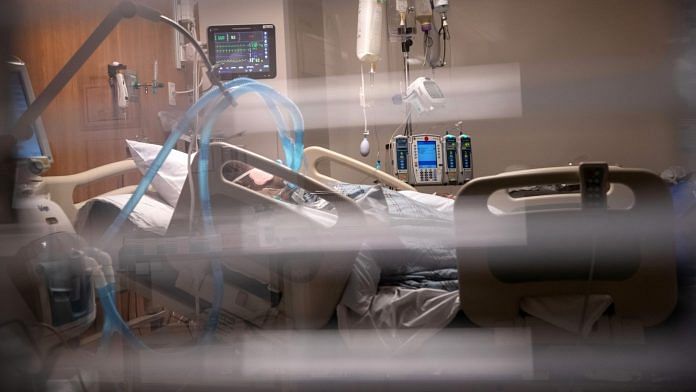New Delhi: A study by researchers at Stanford University has found that fewer than 10 per cent of adults in the US had Covid-19 antibodies as of July, and fewer than 10 per cent of these were diagnosed as sero-positive.
The study highlighted the need for targeted public health interventions among racial and ethnic minorities, and densely populated communities.
In a paper published in The Lancet Saturday, the researchers concluded: “During the first wave of the COVID-19 pandemic, fewer than 10% of the US adult population formed antibodies against SARS-CoV-2, and fewer than 10% of those with antibodies were diagnosed. Public health efforts to limit SARS-CoV-2 spread need to especially target racial and ethnic minority and densely populated communities.”
The US has the highest Covid burden in the world with 71,85,516 cases and 2,07,538 deaths having been reported so far.
The study details
The cross-sectional study looked at 28,503 randomly selected adult patients receiving dialysis in 1,300 facilities across the US in July.
A test with 100 per cent sensitivity and 99.8 per cent specificity was used for the assay.
“Not only is this patient population representative ethnically and socio-economically, but they are one of the few groups of people who can be repeatedly tested. Because renal disease is a Medicare-qualifying condition, they don’t face many of the access-to-care barriers that limit testing among the general population,” said Shuchi Anand, MD, Director, Center for Tubulointerstitial Kidney Disease at Stanford University, and lead author of the study.
“We were able to determine — with a high level of precision — differences in seroprevalence among patient groups within and across regions of the United States, providing a very rich picture of the first wave of the COVID-19 outbreak that can hopefully help inform strategies to curb the epidemic moving forward by targeting vulnerable populations,” Anand said.
Also read: Insufficient interferon – the reason why coronavirus could be deadly for some patients
Possibility of overestimating sero prevalence
Admitting that dialysis patients may not be representative of the entire population as they are “less likely to be employed and more likely to restrict their mobility and social activity due to advanced age and frailty”, the researchers said the study may overestimate seroprevalence in the general population because of higher incidence of kidney diseases in some ethnic groups.
For example, Black Americans have a nearly four-times higher risk of end-stage kidney disease than white Americans.
“Moreover, the process of undergoing incentre haemodialysis might include the use of public or non-public shared transportation to and from the facility, and 10–12 h of care delivered in indoor facilities,” the researchers wrote.
The findings showed that compared to the majority non-Hispanic white population, people living in predominantly Black and Hispanic neighbourhoods were two-four times likelier to contract Covid-19 infection — rates of Covid infection were 11.3-16.3 per cent in Black and Hispanic neighbourhoods, compared to 4.8 per cent in the majority non-Hispanic white population.
Poorer areas experienced a two-times higher likelihood, and the most densely populated areas showed a 10-times higher likelihood of SARS-CoV-2 seropositivity.
The researchers recommended sustained surveillance for better management of the pandemic.
“These data can help to inform surveillance and management strategies during the next phase of the pandemic. Serial sampling of dialysis remainder plasma should be used to determine trends in disease prevalence and the effect of various strategies being implemented around the USA to reduce the burden of COVID-19 on the general population,” they wrote.
Also read: How Italy is coping better as Spain, France & UK deal with nightmares of second Covid wave



